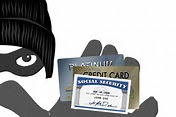What do you think of
when someone says that they have had their identity stolen? If you are
like most people, you immediately assume that a criminal has gotten some of
their actual credit cards and used them to make unauthorized purchases.
If you are someone who uses your personal computer or mobile device for a
lot of transactions, you may even think that some malware that stole a credit
card number from an online transaction. While these are excellent
examples of what can happen when someone steals specific financial information,
they are only the tip of the iceberg with regard to what can happen when your entire identity is stolen.
 If you become a victim of identity theft,
your credit history and credit score are important concerns. But, there
is a lot more on the line. A criminal who is able to access your birth
date, social security number and address can essentially assume your entire
identity for a number of purposes that might not immediately come to mind.
They might obtain identification in your name and use that identification
if they are arrested for a crime. An undocumented person could
potentially use such identification to pose as a citizen, gain employment, or
receive healthcare under your identity. An identity thief could even get
married using your name and information. The possibilities are almost
endless. The amount of work that you might have to do to clean up a mess
like this is mind boggling.
If you become a victim of identity theft,
your credit history and credit score are important concerns. But, there
is a lot more on the line. A criminal who is able to access your birth
date, social security number and address can essentially assume your entire
identity for a number of purposes that might not immediately come to mind.
They might obtain identification in your name and use that identification
if they are arrested for a crime. An undocumented person could
potentially use such identification to pose as a citizen, gain employment, or
receive healthcare under your identity. An identity thief could even get
married using your name and information. The possibilities are almost
endless. The amount of work that you might have to do to clean up a mess
like this is mind boggling.
There are a few things you can do to keep your identity safe. Be very careful what sensitive information you share
with others over the phone and online. Sometimes, a thief will send out
what are known as phishing emails. These emails may look like they come
from your bank or your phone company. Don't respond to these emails if
they request sensitive information like your password or social security
number. Contact the company directly to find out if they actually need to
talk to you. Reputable companies will almost never ask for your passwords
in any context.
Keep your sensitive documents secure. Lock up your
birth certificate and social security card when they are not being used.
Secure your online information by using anti virus and anti malware software on
your personal computer. Use strong passwords make up of a combinations of
upper case letters, lower case letters, numbers and symbols. While it is
impossible to keep your identity completely safe all of the time, Identity
Guard® can provide you will tools and support to greatly increase your security
and peace of mind.
No comments:
Post a Comment